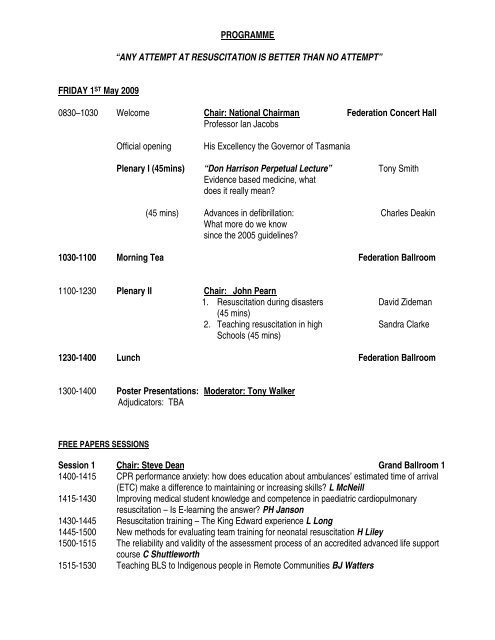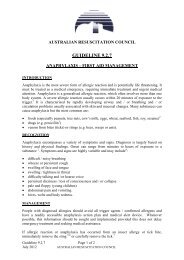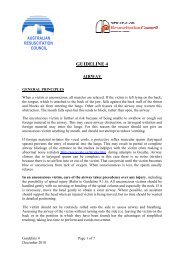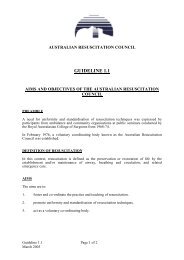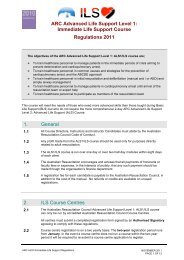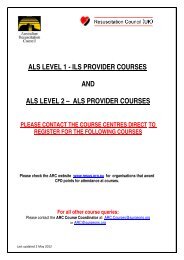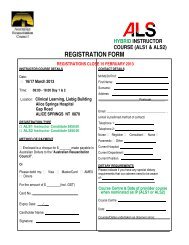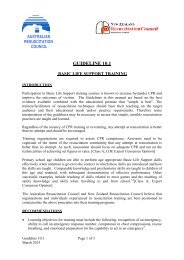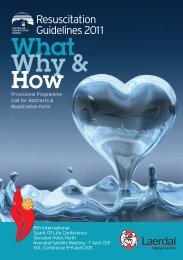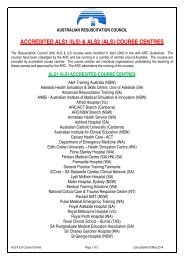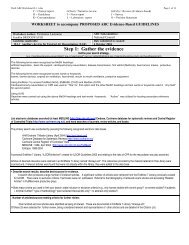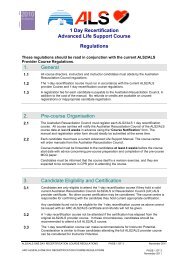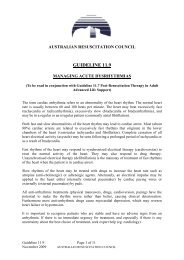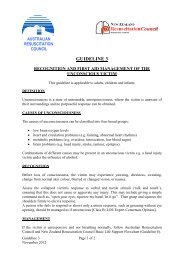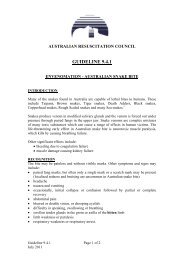FRIDAY 12th April 2002 - Australian Resuscitation Council
FRIDAY 12th April 2002 - Australian Resuscitation Council
FRIDAY 12th April 2002 - Australian Resuscitation Council
You also want an ePaper? Increase the reach of your titles
YUMPU automatically turns print PDFs into web optimized ePapers that Google loves.
PROGRAMME“ANY ATTEMPT AT RESUSCITATION IS BETTER THAN NO ATTEMPT”<strong>FRIDAY</strong> 1 ST May 20090830–1030 Welcome Chair: National Chairman Federation Concert HallProfessor Ian JacobsOfficial openingHis Excellency the Governor of TasmaniaPlenary I (45mins) “Don Harrison Perpetual Lecture” Tony SmithEvidence based medicine, whatdoes it really mean?(45 mins) Advances in defibrillation: Charles DeakinWhat more do we knowsince the 2005 guidelines?1030-1100 Morning Tea Federation Ballroom1100-1230 Plenary II Chair: John Pearn1. <strong>Resuscitation</strong> during disasters David Zideman(45 mins)2. Teaching resuscitation in high Sandra ClarkeSchools (45 mins)1230-1400 Lunch Federation Ballroom1300-1400 Poster Presentations: Moderator: Tony WalkerAdjudicators: TBAFREE PAPERS SESSIONSSession 1 Chair: Steve Dean Grand Ballroom 11400-1415 CPR performance anxiety: how does education about ambulances’ estimated time of arrival(ETC) make a difference to maintaining or increasing skills? L McNeill1415-1430 Improving medical student knowledge and competence in paediatric cardiopulmonaryresuscitation – Is E-learning the answer? PH Janson1430-1445 <strong>Resuscitation</strong> training – The King Edward experience L Long1445-1500 New methods for evaluating team training for neonatal resuscitation H Liley1500-1515 The reliability and validity of the assessment process of an accredited advanced life supportcourse C Shuttleworth1515-1530 Teaching BLS to Indigenous people in Remote Communities BJ Watters
Session 2 Chair: Peter Warfe Grand Ballroom 21400-1415 Medical student confidence to resuscitate is influenced more by clinical experiences than aresuscitation course M Heily1415-1430 Validation of a termination of resuscitation algorithm in out-of-hospital cardiac arrest with a nonshockablerhythm receiving advanced life support MB Skrifvars1430-1445 Ventilation guidelines in CPR: are they too hard to achieve? Z Nehme1445-1500 The metropolitan fire brigade emergency responder program – a review of the first seven yearsM Boyle1500-1515 Continuous insufflation of oxygen: an alternative ventilation method in cardiac arrest A Trewin1515-1530 In hospital cardiac arrest – living proof M PadgetSession 3 Chair: Frank Bridgewater Grand Ballroom 31400-1415 ‘Flinging the Squailer’. Lifeline rescues for drowning victims J Pearn1415-1430 Paramedic attitudes to prehospital resuscitation T Ivanov1430-1445 <strong>Resuscitation</strong> challenges in very remote <strong>Australian</strong> hospitals: an analysis of 15 resuscitationattempts in one hospital PA Griswold1445-1500 The challenges of reducing drowning deaths in Australia by 50% R Franklin1500-1515 The Irukandji syndrome – new species and management guidelines LA Gershwin1515-1530 Teaching culturally diverse communities CPR with “4 steps for life” LJ Kamp1530-1600 Afternoon tea Federation Ballroom1600-1700 Plenary III Chair: Hugh GranthamDecision rules for termination ofresuscitation (45 mins)Laurie Morrison1700 Close1930 Conference Dinner
SATURDAY 2 nd May 20090900-1030 Plenary IV Chair: Malcolm Anderson Federation Concert Hall(Using evidence in practice) 1. The Legal Status of Guidelines (30min) Jim Tibballs2. How do we learn? (30 mins) Russell Jones3. Learn CPR in 30 minutes (30min) Peter Morley1030-1100 Morning tea Federation Ballroom1100-1300 Concurrent I Chair: Jennifer Dennett Grand Ballroom 1(Paediatric Management) 1. The Role of Pulse Palpation in Jim TibballsStarting CPR (30min)2. Children as rescuers (30min) Sandra Clarke3. <strong>Resuscitation</strong> of children and infants (30min) David Zideman4. Fluid resuscitation in children (30 mins) Richard AickinConcurrent II Chair: John Hall Grand Ballroom 2(Roles / Teamwork) 1. Airway management in trauma Tony Smith2. Paramedics RSI after severe traumaticbrain injury (30min)Stephen Bernard3. Delivering resuscitation instructions Charles Deakinby telephone - challenges for ambulanceservice CPR delivery (30min)4. “Code Blue: 222” Malcolm AndersonStandardising in-hospital resuscitation(30min)Concurrent III Chair: Julie Considine Grand Ballroom 3(Education) 1. ALS Assessments – Judy CurreyBang for buck or bad investment (30min)2. Effective facilitation (30min) Russell Jones3. ARC / ILS / ALS / Instructors Ian JacobsCourse (30min)4. eLearning & resuscitation training Shane Lenson1300 – 1400 Lunch Federation Ballroom
1400-1530 Concurrent IV Chair: Richard Aickin Grand Ballroom 1(Trauma) 1. Trauma medicine shock: how Hugh Granthammuch have we forgotten (30min)2. Cutting edge developments in trauma Michael Parr(30min)3. Trauma in Tarin Kowt – Afghanistan David Scott(30min)Concurrent V Chair: Michael Anderson Grand Ballroom 2(<strong>Resuscitation</strong> evidence) 1. International process (30min) Peter Morley2. Quality CPR (30min) Ian Jacobs3. Mechanical CPR adjuncts: Laurie Morrisonis there any evidence they work? (30min)Concurrent VI Chair: Shane Lenson Grand Ballroom 3(Clinical updates) 1. A systems approach to reperfusion Darren Waltersin ST elevation myocardial infarction (30 min)2. Anaphylaxis (30min) Jane Peake3. Evidence based approachto stroke care (30min)Julie Considine1530-1600 Afternoon tea Federation Ballroom1600-1650 Plenary V Chair: Peter Morley Federation Concert HallPanel discussion: resuscitation controversies, debate & discussion1650-1700 Closing remarksLaurie Morrison, David Zideman, Sandra Clarke Charles Deakin,Tony Smith, Ian Jacobs
BIOGRAPHIESKeynote speakers – see registration brochureInvited speakersDr Richard AickinDr Malcolm AndersonA/Prof Stephen BernardDr Julie ConsidineDr Judy CurreyDr Hugh GranthamProf Ian JacobsProf Russell JonesMr Shane LensonDr Peter MorleyDr Michael ParrDr Jane PeakeDr David ScottA/Prof Jim TibballsA/Prof Darren WaltersChairman New Zealand <strong>Resuscitation</strong> <strong>Council</strong>; Deputy Convener ARC Paediatricsubcommittee; Paediatric Emergency Physician & Clinical Director, Starship Children’sHospital, Auckland, New ZealandChairman ARC Tasmanian Branch; Anaesthetist, Royal Hobart HospitalIntensive Care Physician, The Alfred Medical Advisor DHS, Metropolitan AmbulanceServiceARC representative: College of Emergency Nursing Australasia; Senior ResearchFellow, Deakin University-Northern Health Clinical Partnership, Victoria, AustraliaSenior Lecturer, Co-ordinator Postgraduate Critical Care and Perioperative Programs,Deakin University, Victoria, AustraliaSenior Research Fellow, Alfred/Deakin Nursing Research CentreChairman ARC South <strong>Australian</strong> Branch; Medical Director of the South <strong>Australian</strong>Ambulance ServiceChairman, ARC; Chairman ARC Western <strong>Australian</strong> Branch; Clinical Epidemiologist &Head of Unit, Department of Emergency Medicine, University of Western AustraliaDirector of Assessment, Royal <strong>Australian</strong> College of General PractitionersProfessor, Centre for Medical and Health Sciences Education and the Department ofAnaesthesia and Perioperative Medicine, Monash UniversityARC representative: Royal College of Nursing Australia; Manager of EmergencyDepartment Services, Calvary Health Care, ACT, AustraliaDeputy Chairman, ARC; Convenor ARC ALS subcommittee; ARC representative:<strong>Australian</strong> & New Zealand Intensive Care Society; Consultant Intensivist andAnaesthetist, Royal Melbourne HospitalARC representative: <strong>Australian</strong> and New Zealand College of Anaesthetists; DeputyConvenor ARC ALS subcommittee; Director of Intensive Care, Liverpool Hospital,Sydney, AustraliaSenior Lecturer / Paediatric Immunologist and Allergist, University of QueenslandARC representative: <strong>Australian</strong> Defence Force; Senior Consultant AnaesthetistChair, DHS Anaesthesia Consultative Group, ADFARC Paediatric representative. Intensive Care Unit, Royal Children’s Hospital,Melbourne, AustraliaARC representative: The Cardiac Society of Australia and New Zealand; Director ofCardiology, The Prince Charles Hospital, Brisbane, Australia


